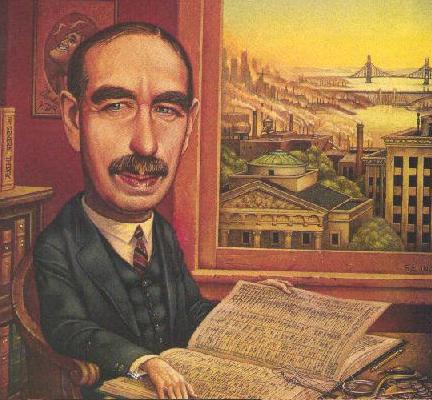Here’s an article citing Martin Wolf (chief economics commentator at the Financial Times), by Brad DeLong. Are we all Keynesians now? What is a Keynesian anyway?
"According to Keynesian economics the state should stimulate economic growth and improve stability in the private sector – through, for example, interest rates, taxation and public projects."
Martin Wolf Puts It Better than Anyone Else I Have Seen
Courtesy of Brad DeLong, at Grasping Reality, the Semi-Daily Journal of Economist Brad DeLong: A Fair, Balanced, Reality-Based, and More than Two-Handed Look at the World.
Martin Wolf on our current magneto trouble:
We are all Keynesians now. When Barack Obama takes office he will propose a gigantic fiscal stimulus package. Such packages are being offered by many other governments. Even Germany is being dragged, kicking and screaming, into this race.
The ghost of John Maynard Keynes, the father of macroeconomics, has returned…. Like all prophets, Keynes offered ambiguous lessons to his followers. Few still believe in the fiscal fine-tuning that his disciples propounded in the decades after the second world war. But nobody believes in the monetary targeting proposed by his celebrated intellectual adversary, Milton Friedman…. Now… it is easier for us to understand what remains relevant in his teaching….
[Hyman] Minsky… we should not take the pretensions of financiers seriously. “A sound banker, alas, is not one who foresees danger and avoids it, but one who, when he is ruined, is ruined in a conventional way along with his fellows, so that no one can really blame him.” Not for him, then, was the notion of “efficient markets”….
[T]he economy cannot be analysed in the same way as an individual business. For an individual company, it makes sense to cut costs. If the world tries to do so, it will merely shrink demand….
The third and most important lesson is that one should not treat the economy as a morality tale. In the 1930s, two opposing ideological visions were on offer: the Austrian; and the socialist. The Austrians – Ludwig von Mises and Friedrich von Hayek – argued that a purging of the excesses of the 1920s was required. Socialists argued that socialism needed to replace failed capitalism, outright. These views were grounded in alternative secular religions…. Keynes’s genius – a very English one – was to insist we should approach an economic system not as a morality play but as a technical challenge. He wished to preserve as much liberty as possible, while recognising that the minimum state was unacceptable to a democratic society with an urbanised economy. He wished to preserve a market economy, without believing that laisser faire makes everything for the best in the best of all possible worlds.
This same moralistic debate is with us, once again. Contemporary “liquidationists” insist that a collapse would lead to rebirth of a purified economy. Their leftwing opponents argue that the era of markets is over. And even I wish to see the punishment of financial alchemists who claimed that ever more debt turns economic lead into gold. Yet Keynes would have insisted that such approaches are foolish. Markets are neither infallible nor dispensable…. [T]he task for this new administration is to lead the US and the world towards a pragmatic resolution of the global economic crisis we all now confront….
The shorter-term challenge is to sustain aggregate demand, as Keynes would have recommended…. [T]he load will fall on the US, largely because the Europeans, Japanese and even the Chinese are too inert, too complacent, or too weak…. [T]his period of high government spending is, alas, likely to last for years….
No less pragmatic must be the attempt to construct a new system of global financial regulation and an approach to monetary policy that curbs credit booms and asset bubbles. As Minsky made clear, no permanent answer exists. But recognition of the systemic frailty of a complex financial system would be a good start.
As was the case in the 1930s, we also have a choice: it is to deal with these challenges co-operatively and pragmatically or let ideological blinkers and selfishness obstruct us…
*******
See also: "We Are All Keynesians Now", Time, Dec. 31, 1965
The ideas of economists and political philosophers, both when they are right and when they are wrong, are more powerful than is commonly understood. Indeed the world is ruled by little else. Practical men, who believe themselves to be quite exempt from any intellectual influences, are usually the slaves of some defunct economist.
—The General Theory of Employment, Interest and Money
Concluding his most important book with those words in 1935, John Maynard Keynes was confident that he had laid down a philosophy that would move and change men’s affairs…



